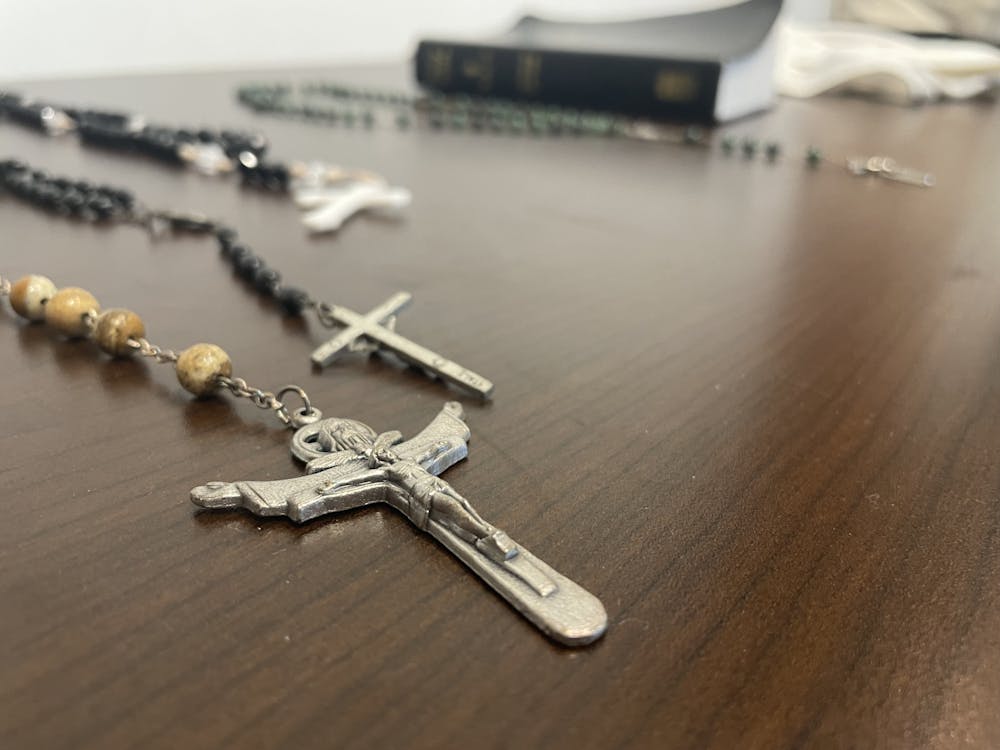Senior Mallorie Sievert is determined to fill a gap in Catholic theater — exploring LGBTQ+ themes and narratives.
Inspired by the combined experiences of seeing a queer retelling of Joan of Arc at the Globe Theatre in London, visiting Santa Catalina monastery in Peru and her own Catholic upbringing, Sievert wrote a play about LGBTQ+ Catholic nuns in the 17th century.
“The City-Women” will have a staged reading at 6 p.m. March 18 in the Center for the Arts Isabella Cannon Room. Tickets are free and can be reserved online.
“This piece means a lot to me, it’s my heart and soul. It’s a story that I needed to hear three, four years ago,” Sievert said. “Even though I didn’t get that when I needed it, I hope that someone can.”
The play, which is part of her honors thesis, follows the love story of Ana and Teresa, who Sievert said were based on the biblical archetypes of the “whore” and the “bride,” respectively. The name of the play itself is a reference to these archetypes as they are seen in the Book of Revelations.
“The City-Women” also had a staged reading March 15, where her fellow students brought to life a story Sievert said “lived inside” her for many years. Over 30 people — students and community members alike — attended the reading, including Father Peter Tremblay, Elon Catholic campus minister and associate chaplain for Catholic life.
“I just think about if Mallorie from three or four years ago could see that my mom and a priest came to watch a play that I wrote about gay nuns,” Sievert said.
Beyond exploring narratives of Catholic women whose “stories have been eclipsed,” Sievert had to strike the balance between what was interesting academically and what was engaging theatrically. Sievert’s research was about LGBTQ+ Catholic experiences, early feminist Christian texts and presenting those underrepresented experiences theatrically.
She said one of her favorite aspects of the reading was getting to see people react to her work, laughing at the light-hearted moments despite tear-stained faces. She said it was empowering to see people connect with the play in the same ways she felt while writing it.
In addition to their archetypes, Sievert also said she based the characters around herself and how she was navigating the intersections of her “queerness” and Catholicism and the two paths she felt she had — to leave the church or to stay.
“I didn't want to villainize God or villainize the church or anything,” Sievert said. “I really wanted it to be about the fact that being queer and having faith and loving God don't have to be mutually exclusive.”
By exploring her own convictions about God and faith through academic research and writing “The City-Women,” Sievert said it was healing to learn the stories of Catholic women alongside her characters.
Sievert said there’s one scene in the show between Ana and the head of the nuns that encapsulated the core message of “The City-Women.”
“God made me and God made me perfectly. Are you going to say that he made me so that my very existence was sinful?” Ana, played by junior Aubee Billie, said in the staged reading March 15. “What kind of a God would do that? Create me with the ability to love and the desire to love and trick me and go ‘uh-ah-ah, if you do it you’ll be sinning against me.’ That’s not the God you taught me about.”
Moving forward, Sievert will be defending her thesis, presenting at Elon’s Spring Undergraduate Research Forum and applying for grants in hopes to publish and produce “The City-Women.”


